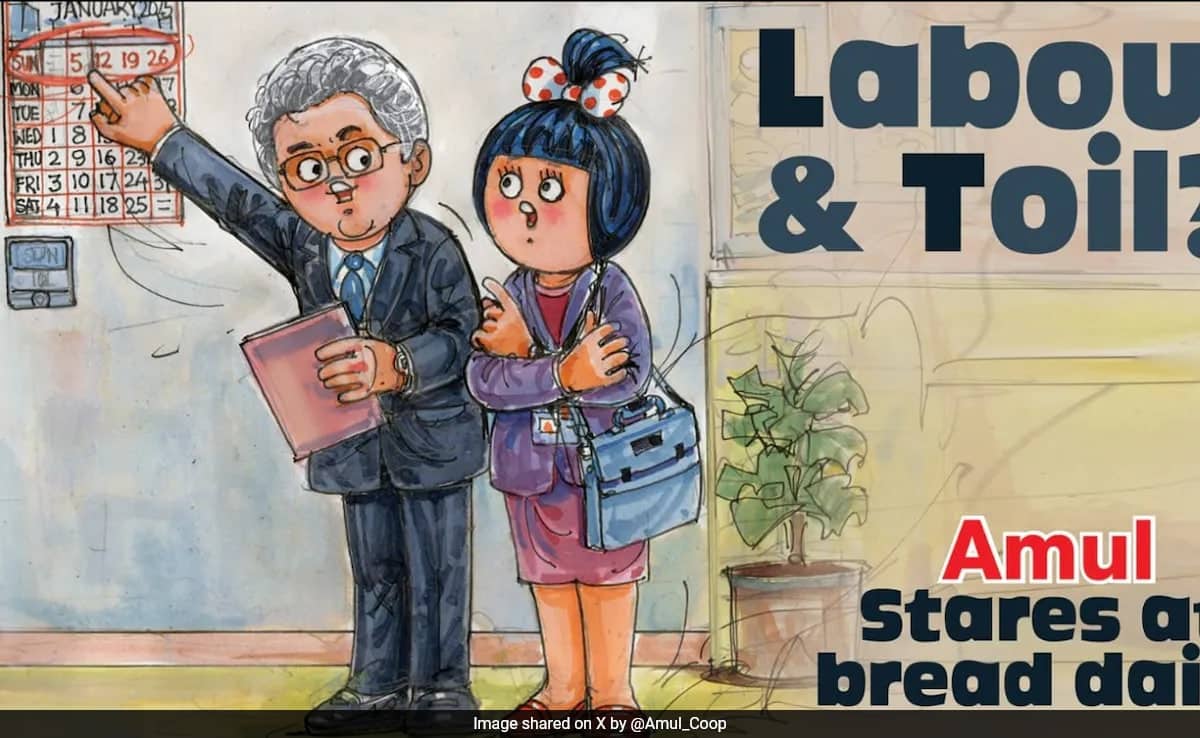Amul’s Doodle Sparks Debate on Work Hours

The dairy brand Amul is renowned for its clever and timely graphics that comment on current events. From sports to entertainment, Amul’s doodles often reflect the pulse of society. Recently, the brand took a bold step into the ongoing debate about long working hours. This discussion was reignited by Larsen & Toubro (L&T) chairman SN Subrahmanyan, who suggested that employees should work up to 90 hours a week, including Sundays. Amul’s latest doodle humorously addresses this controversial statement, adding a layer of social commentary to the conversation.
Amul’s Creative Response to Controversy
On January 14, 2025, Amul shared a quirky doodle that directly referenced the ongoing debate about the 90-hour workweek. The doodle featured the phrase “Labour and Toil?” with the letters “L” and “T” emphasized, cleverly alluding to L&T. The caption read, “Controversy about the 90-hour work week!” This playful jab at Subrahmanyan’s comments included a humorous twist on his remark about how long one can “stare at their spouse.” Amul’s response stated, “Amul stares at bread daily,” showcasing their signature wit.
This doodle not only entertained but also sparked further discussion on social media. The brand’s ability to engage with current events in a light-hearted manner has made it a beloved part of Indian culture. By addressing such a serious topic with humor, Amul encourages dialogue about work-life balance and the expectations placed on employees in today’s fast-paced world.
The Backlash Against Long Work Hours
Subrahmanyan’s comments did not go unnoticed. Many social media users expressed their discontent, comparing his statements to those made by Infosys founder Narayana Murthy, who previously suggested that employees should work 70 hours a week. Critics questioned the rationale behind expecting lower-paid employees to adhere to such demanding schedules, especially when CEOs often enjoy higher salaries and different job pressures.
Prominent figures also joined the conversation. Bollywood actress Deepika Padukone and Harsh Goenka, chairperson of the RPG Group, condemned Subrahmanyan’s remarks. Goenka humorously suggested renaming Sunday to “Sun-duty,” highlighting the absurdity of such expectations. This backlash reflects a growing concern about work culture in India, where long hours are often normalized, leading to discussions about mental health and employee well-being.
The Global Context of Overwork in India
The debate surrounding the 90-hour workweek is not just a local issue; it reflects a broader trend of overwork in India. According to the International Labour Organisation (ILO), India ranks 13th among the most overworked countries globally. The ILO’s report reveals that Indian employees work an average of 46.7 hours per week, with 51% of the workforce clocking in 49 or more hours each week. This statistic places India second in the world for prolonged working hours.
As the nation grapples with the implications of such work schedules, industry leaders like Anand Mahindra have weighed in. Mahindra emphasized the importance of focusing on productivity and efficiency rather than merely the number of hours worked. This perspective advocates for a shift in workplace culture, encouraging companies to prioritize the quality of work over quantity.
Observer Voice is the one stop site for National, International news, Sports, Editor’s Choice, Art/culture contents, Quotes and much more. We also cover historical contents. Historical contents includes World History, Indian History, and what happened today. The website also covers Entertainment across the India and World.

